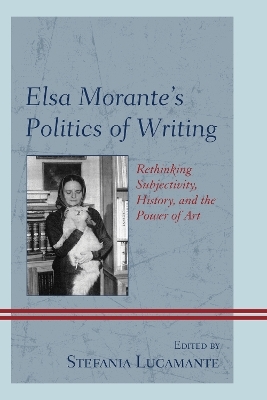
Elsa Morante's Politics of Writing
Fairleigh Dickinson University Press (Verlag)
978-1-61147-794-8 (ISBN)
Elsa Morante’s Politics of Writing is a collected volume of twenty-one essays written by Morante specialists and international scholars. Essays gather attention on four broad critical topics, namely the relationship Morante entertained with the arts, cinema, theatre, and the visual arts; new critical approaches to her four novels; treatment of body and sexual politics; and Morante’s prophetic voice as it emerges in both her literary works and her essayistic writings. Essays focus on Elsa Morante’s strategies to address her wide disinterest (and contempt) for the Italian intellectual status quo of her time, regardless of its political side, while showing at once her own kind of ideological commitment. Further, contributors tackle the ways in which Morante’s writings shape classical oppositions such as engagement and enchantment with the world, sin and repentance, self-reflection, and corporality, as well as how her engagement in the visual arts, theatre, and cinematic adaptations of her works garner further perspectives to her stories and characters. Her works—particularly the novels Menzogna e sortilegio (House of Liars, 1948), La Storia: Romanzo (History: A Novel, 1974) and, more explicitly, Aracoeli (Aracoeli, 1982)—foreshadowed and advanced tenets and structures later affirmed by postmodernism, namely the fragmentation of narrative cells, rhizomatic narratives, lack of a linear temporal consistency, and meta- and self-reflective processes.
Stefania Lucamante is professor of Italian at the Catholic University of America, Washington, DC.
Introduction, Stefania Lucamante
Chapter 1: Daniele Morante: “Elsa Morante’s Correspondence: A New Source for the Artist’s Biography”
Chapter 2: Giuliana Zagra: “Writing: A Lifelong Affair. Notes from the Elsa Morante Archives”
Part One: New Approaches to Morante’s Oeuvre
Chapter 3: Francesco Chillemi: “In the Realm of the Lie: The Implosion of Thought and the Monsters of Reason in Menzogna e Sortilegio”
Chapter 4: Saskia Ziolkowski: “Morante and Kafka: The Gothic Walking Dead and Talking Animals”
Chapter 5: Sarah Carey: “Elsa Morante: Envisioning History”
Chapter 6: Sharon Wood: “Excursus as Narrative Technique in La Storia”
Chapter 7: Stefania Lucamante: “‘The World Must Be the Writer’s Concern’: Elsa Morante’s Visions of History”
Chapter 8: Lorenzo Salvagni: “In Marguerite Caetani’s Literary Salon: a Study of Elsa Morante’s Contributions to Botteghe Oscure”
Part Two: Theater, Visual Arts and Cinema
Chapter 9: Gabrielle Orsi: “Lo Scialle Andaluso: The Intimate Theater of Elsa Morante”
Chapter 10: Gandolfo Cascio: “Elsa Morante’s Pictorial References and Ekphrasis in Alibi: from Vittore Carpaccio to Silvestro Lega”
Chapter 11: Claude Cazalé Bérard: “Senza i conforti della religione: An Interrupted Path between Cinema and Poetic Creation”
Chapter 12: Hanna Serkowska: “Arturo in the World of the ‘Pharisee Fathers’: The Cinematic Adaptation of Arturo’s Island”
Chapter 13: Thomas Harrison: “No Novel is an Island: Damiano Damiani’s L’isola di Arturo”
Chapter 14: Giovanna De Luca: “The Myth of Childhood: Luigi Comencini’s Adaptation of La Storia”
Chapter 15: Gaetana Marrone: “Staging a Writer’s Journey: Elsa Morante by Francesca Comencini”
Part Three: Queering Morante: Bodies that Matter from Diario 1938 to Aracoeli
Chapter 16: Katrin Wehling-Giorgi: “Tuo scandalo tuo splendore”: The Split Mother in Morante’s Works from Diario 1938 to Aracoeli
Chapter 17: Manuele Gragnolati: “Differently Queer: Sexuality and Aesthetics in Pier Paolo Pasolini’s Petrolio and Elsa Morante’s Aracoeli”
Chapter 18: Maria Morelli: “Kaleidoscopic Sexualities: Defying Normative Resistance and Maternal Melancholia in Aracoeli”
Part Four: Morante’s Essays: the Self, Society and Art
Chapter 19: Flavia Cartoni: “Between Perception and Prophecy: Elsa Morante’s Reflections for the Present”
Chapter 20: Kenise Lyons: “‘Pro o Contro La rabbia’: Elsa Morante, Pier Paolo Pasolini and the Work of Art in the Atomic Age”
Chapter 21: Claudia Karagoz: “Timely Anachronisms: Elsa Morante, Adriana Cavarero and Roberto Esposito on Power, Violence, and Subjectivity”
Analytical Index
Bios contributors
| Co-Autor | Claude Cazalé Bérard, Sarah Carey, Flavia Cartoni, Gandolfo Cascio |
|---|---|
| Verlagsort | Cranbury |
| Sprache | englisch |
| Maße | 163 x 239 mm |
| Gewicht | 562 g |
| Themenwelt | Geisteswissenschaften ► Sprach- / Literaturwissenschaft ► Anglistik / Amerikanistik |
| Geisteswissenschaften ► Sprach- / Literaturwissenschaft ► Literaturwissenschaft | |
| Sozialwissenschaften ► Soziologie ► Gender Studies | |
| ISBN-10 | 1-61147-794-8 / 1611477948 |
| ISBN-13 | 978-1-61147-794-8 / 9781611477948 |
| Zustand | Neuware |
| Haben Sie eine Frage zum Produkt? |
aus dem Bereich


